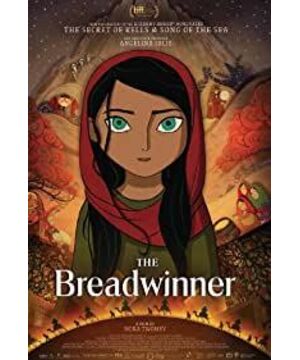The story is about 11-year-old Parwana, who has a poor and happy home in Kabul. Whenever he was so poor that he was hungry to drink water, his father would take his daughter to the market to become a seller. In Afghanistan, under the control of Taliban in 2001, women were never allowed to show their faces, let alone receive education. So, Daddy was taken away by Taliban. Parvana cut off her beloved long hair, put on a boy's clothes, and went to the market to do hard labor while inquiring about her father's whereabouts. I watched the movie "The Breadwinner" several times while holding back my tears. This is not a native Arabic film, this is an Irish film. In traditional Arabic movies, the desires of characters are single, so they appear pure. This movie shows how Parvana-Jiazi copes with difficult situations. Although Parvana has a single desire, the story line and presentation are multi-dimensional. The story is buried in the play to describe the cruelty of the war, which moved me very much. It is based on the story of the war in Afghanistan, but it examines the living conditions of people in the Middle East countries with the eyes of the West and the world. The Western Color of the Arab Story This film has a strong Western color and world view, but it is macro and correct. For example, the girl's companion Shaoshia, she is eager to immigrate to Pakistan, hoping to see the sea. She disguises herself as a man, which is the carrier of the high awakening of female consciousness that Westerners have, and becomes the heroine's friend to awaken and encourage her. This is a traditional Arab Powerful characters not found in the movie. So this film represents the independent mind of women empowerment. In the film, the girl Parvana takes on the responsibility of supporting the family in order to rescue her father from prison. She pretends to be a boy to support the family. She leaves early and returns late every day. Her feet are bruised and even beaten without crying. She is tough and brave. I finally saw it. A character that echoes Ali, the hero of "Little Shoes". She is a girl from the Arab world, she is not a boy. I am especially grateful to the director for giving Parvana the friend Shoshiya when she was at her most helpless. She is not alone. The most touching thing about the sad fairy tales in the play is that the girl at the end uses a story to uncover the scars of the family: "My mother is a writer, my father is a teacher, and my two sisters are always arguing. One day I saw something like a toy on the street. I picked it up and it exploded." Parvana's eldest brother was killed. Her story moved the Demon King Elephant, and it also moved me. The whole film tells the desperate and dark story themes in the form of cartoons, avoiding real-life interpretation, but it is even more sad because of the innocence of children. Afghanistan in the film is surrounded by loess and smog. Only the vegetables and fruits in the vegetable market are brightly colored, and only the fairy tales like shadow play are performed with strong enthusiasm. This is the bravery in a child's heart and the color that life should have.
View more about The Breadwinner reviews











